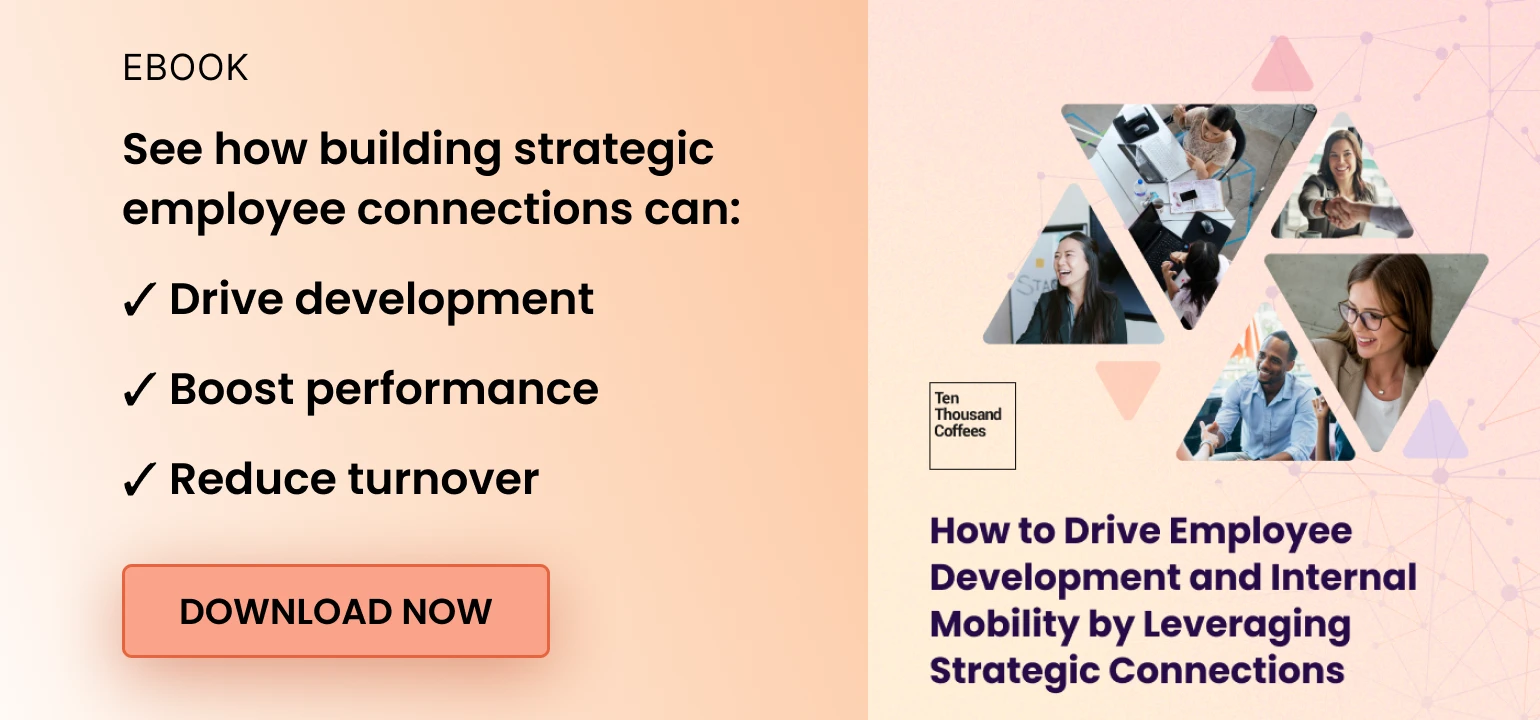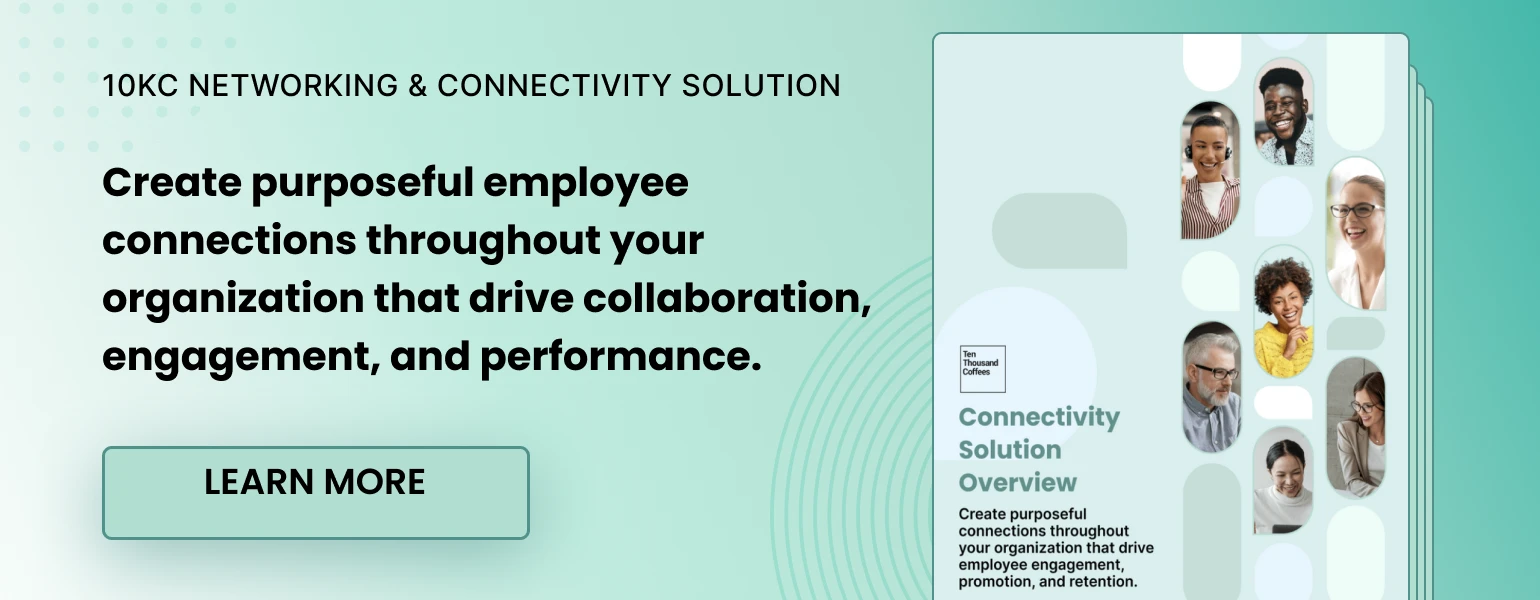From how we work to where we work, a lot has changed about the professional landscape over the last few years. Yet one constant remains: our need for human connection.
Humans are inherently social creatures—which means we tend to thrive in situations where we feel connected to the people around us. And this holds true in the workplace. While employee well-being is an important facet of any holistic talent strategy, connection goes far beyond how employees feel during their workday. It can impact everything from employee performance to your business’s bottom line.
It's easy to hope that valuable connections will magically appear. But similar to our personal relationships, cultivating valuable relationships in the workplace requires nurturing and a conscious effort.
In this article, we’ll take a deeper look at the challenges and impact of employee connection. And we’ll explore the employee connection solutions that leading companies are using to drive performance.
The employee connection challenge in a modern workplace
Technology has made connecting with others easier than ever before. We can hop on a video call and meet virtually with peers around the world and message our entire team with just the click of a button.
In theory, creating connections in the modern workplace should be simple and natural. Yet, more often than not, employees are struggling to create the networks needed to level up their performance. Time-starved and stretched thin, they also lack the bandwidth to prioritize relationship-building, even though those very connections hold the key to unlocking better work outcomes and growth.
Between the digital clutter, distributed workforces, and the race for productivity, it’s become a lot more difficult to build and nurture the connections that matter.
Remote and hybrid employees are physically separated, meaning we lose the authentic water cooler moments of offices in decades past. Digital-first communication can often feel transactional and lack the personal touch needed to lead to real relationships. And of course, the fast-paced work environment means employees are busier than ever, forcing them to resort to quick, surface-level interactions.
“An employee's network is the number one predictor of their performance. So how you create programmatic opportunities for people to build relationships directly impacts whether they'll be successful or not.” - Dave Wilkin, Co-founder, 10KC
While the connectivity challenges are valid, it’s made it difficult for teams to reach their full potential. Lack of connection reduces collaboration and creates unnecessary silos among teams—impacting everything from employee engagement to ironically enough, employee productivity.
The positive impact of employee connection solutions
The truth is, fostering a culture of connection is a deliberate act. It's the organization's duty to provide the support, structure, and tools that empower employees to build meaningful relationships. By facilitating the right connections and conversations, organizations can unlock the true potential of their workforce, driving collaboration, knowledge sharing, and growth.
Remember: Fostering employee connections isn’t just about protecting employee wellbeing or making them feel like they belong. When companies invest in employee connection solutions, it provides tangible value for both the company and its employees.
Increased employee connection can drive:
1. Elevated employee engagement and retention
Your business outcomes are only as good as the people on your team. Which is why creating a motivating culture that enhances job satisfaction and reduces employee turnover is critical to nurturing high-performing teams.
When employees don’t feel a sense of belonging or loyalty to your organization, they’re less likely to be engaged in their work. And we know employee engagement is closely tied to revenue, with a Gallup study finding engaged teams outperform their competitors in profitability by as much as 23%.
A 10KC study found that 62% of employees would leave their jobs for another company where they felt more connected to their peers. So, if employees are left isolated or disengaged for prolonged periods of time, they’re likely to leave altogether. When you boost employee belonging you can reduce the risk of turnover by as much as 50%.
“In every aspect of the way we live our lives as human beings, we want to belong. And the easier we make it for individuals to feel themselves as part of something, the more likely it is for those people to stay, to grow and develop in that environment. [...] So reducing those barriers to belonging is so key. And the way you create belonging is through relationship.” - David Simmonds, SVP, Global Chief Communications and Sustainability Officer, Canada Life
2. Enhanced development and internal mobility
With the 70-20-10 learning model, we know that 20% of development comes from informal and social learning. When employees are connected with one another, it creates a flow of information that allows employees to learn the way they know best—from other people.
Social learning—learning that happens through developmental relationships and interactions with others— provides opportunities for skills development based on every employee’s unique needs, putting them in the driver's seat of their own development. And with career pathing more complex than ever before, connected workplaces give employees access to resources that help them better navigate their career lattices. By putting employees in the driver's seat of their development, it can unlock hidden potential—that they may not even have been aware of themselves—and boost employee morale.
When employees are able to see themselves in future roles within the organization and identify the skills they need to get there, you end up with a much stronger bench and more robust internal talent pipeline.

3. Transfer of institutional knowledge
Over time, employees develop expertise and insights that are unique to their roles and your organization. This allows them to work more effectively and efficiently toward company goals. This institutional knowledge can be difficult to document, meaning this all-too-valuable information ends up locked in an employee’s mind.
When teams are connected with one another, it creates paths for key knowledge to flow through the organization. And with the right connections, it prevents employees from having to seek out context or waste valuable time figuring out what they don’t know. When knowledge transfer is status quo, it also gives employees better visibility into what the rest of the team is working toward.
But when teams are stuck in silos, this information is trapped and then ultimately lost when the employee who holds that knowledge leaves the organization.
4. Stronger and more cohesive organizational culture
A culture of collaboration and knowledge sharing ensures employees are aligned and working toward company goals, together. But if employees aren’t engaging with one another, that type of organizational cohesion is next to impossible.
Intentional connectivity efforts help minimize silos and isolated teams. It ensures that critical information around business goals are being shared across the organization, helping employees find a sense of purpose in their everyday tasks.
But equally—if not more importantly—it fosters a sense of unity and belonging. When companies have a strong organizational culture, it boosts inclusion, innovation, and collaboration—resulting in up to a 4x increase in revenue growth.
Breaking down silos and fostering collaboration in the modern workplace
Lack of connection is often driven by silos within the workplace. These silos can emerge because employees aren’t comfortable connecting with their peers or simply because their workflow doesn’t leave room for cross-team collaboration. And unfortunately, once those walls in the workplace are built up, they can be incredibly difficult to break down—particularly in distributed teams where chance encounters and organic connections are few and far between.
But by intentionally creating opportunities for connections that make an impact, organizations can start to create paths between teams that help break the silos down over time.
Let’s explore a few tactics for fostering better connections in the workplace:
1. Facilitate meaningful matches
Not all connections are made equal, especially when they don’t come naturally. While we’d love for the right people to serendipitously meet at the right time, that’s rarely the case—especially with fewer teams spending all their time in the same office.
Employee connectivity isn’t just forcing random colleagues into a room together, physically or virtually. For connection solutions to make an impact, you need to pair talent with the peers, leaders, and mentors who can help them perform at their highest level.
Instead of guessing, 10KC’s Smart Matching algorithm automatically matches employees based on organizational attributes and skills, so you and your employees can make the most of every match.
“So much of relationship building and social learning is out of sight, out of mind. We actually don't know how it's going, but we hope that it's happening. Think about all your new hire programs or your people manager programs. Are they getting connected to the right people? Are they getting the right networks? It's really dependent on the manager, which is a very inefficient and high risk way to do it.” -Dave Wilkin, Co-founder, 10KC
.webp)
2. Create intentional conversations
The initial connection is only the first step.
Once an introduction is made, you need to help employees turn those connections into relationships and development opportunities. How does that happen? Through conversations.
But while relationships can be built talking about an employee’s favorite movies or travel destinations, those discussions hardly translate into business outcomes.
Discussion guides and curriculums help keep conversations on track and focused on the things that matter, such as the skills employees need to develop to perform at their best.
3. Go beyond 1-1 connections:
It’s no secret that we love a good 1-1 mentorship opportunity. But individual connections aren’t the only way to help employees build up their networks and create a sense of belonging in the workplace.
Group learning experiences and interactive sessions, such as AMAs, and roundtables, provide employees with the opportunity to connect with their peers in a variety of formats. It creates the cross-functional learning opportunities that foster relationships, while ensuring every employee has access to the leaders and SMEs they need to grow.
4. Turn connections into business outcomes
Rather than one-off mentorship opportunities or conversations, keep employees engaged and growing with curated learning pathways that are directly connected to business outcomes. Think of the possibilities, like:
Accelerated onboarding and time-to-productivity: New hires can quickly get up-to-speed and contribute meaningfully with targeted connectivity and onboarding programs that provide the essential knowledge, networks, and context they need to succeed.
READ MORE: How 10KC Accelerates and Scales Employee Onboarding
Elevated manager effectiveness: Leverage social learning to provide managers with a holistic, real-world development experience and cultivate more consistent leadership style across your organization that drives performance.
Increased revenue and improved client outcomes: By equipping employees with the knowledge and connections they need to excel, curated learning pathways can provide a 360 view of the customer that directly impacts your bottom line.
A surge in innovation: When knowledge sharing is embedded in the company culture, it fosters a collaborative environment where employees are more likely to work together to share insights and develop unique solutions.
Faster, more effective problem-solving: By unlocking collective intelligence, employees gain valuable historical context, reducing redundancy and elevating decision-making. This empowers them to be more agile in navigating change and unexpected situations.
Seamless cultural integration after M&A: Learning pathways can help bridge cultural gaps and foster a sense of unity during mergers and acquisitions, ensuring a smooth transition and maximizing the value of the combined entity.
READ MORE: Overcoming Culture Integration Challenges with 10KC
With 10KC, you can blend a variety of social learning and connectivity experiences together to create a learning ecosystem that gives employees access to the right people and resources at the right time. Then, effortlessly assign talent to specific pathways and experiences, aligning learning with both business objectives and individual development goals.
5. Optimize connections with data
Employee connections shouldn’t be a black box.
With the right tools in place, it’s possible to get visibility into when and how employees are connecting and the conversations that they’re having. It makes it easier to identify silos and gaps in employee networks, so you can work to bridge them.
Real-time data and analytics tools also provide actionable insights that help you optimize your relationship-building initiatives, so you can ensure that every connection ties back to the key metrics that move your business forward.

How companies are connecting their employees with 10KC
In the modern workplace, creating meaningful connections is the key to driving better performance. Here are a few examples of how leading companies are using 10KC to do it.
Creating a connected culture with PwC
With employees spread out across different geographic locations and business units, creating opportunities to connect the right people is often easier said than done.
National professional services firm, PwC, was confident that strengthening internal employee connections would fuel key metrics such as employee engagement and retention. So, using 10KC’s social learning platform they built “Connection Central”, a collaboration hub with the objective of creating deeper and more meaningful connections among employees.
“We wanted to build meaningful connections that superseded historic silos or proximity barriers. We wanted to drive connections that were human-led and tech powered, and 10KC allowed us to do that. The platform has helped us bring intention into conversations, which can be challenging in a remote or hybrid environment.” - Chris Dulny, Chief Digital, Data & Innovation Officer at PwC
Through Connection Central, PwC was able to facilitate over 20,000 employee connections across locations and functions. They also hosted over 170 small group events to connect employees with leaders and other key culture carriers across the business.
Not only were they able to create employee connections at scale, but they were able to measure the impact on culture and performance. The program achieved a 96% favorable rating from participants and generated a 78% adoption rate among employees.
“With 10KC, we now have an ideal platform to enable connection on a number of dimensions and extend our reach across the national firm in ways that would not have been possible for us in the past. We’re living a new normal with 10KC that addresses our evolving needs and challenges and enables our focus on building and sustaining an inclusive and caring workplace.” - Soula Courlas, Interim Chief People Officer, PwC
LEARN MORE: See how PwC used 10KC to break down silos and build meaningful interactions
GE’s formula for winning employee engagement
The industry-leading GE Digital Team understood the value in their people, centering their talent strategy around three pillars: grow, engage, and value. However, with a large, hybrid, and dispersed workforce, it was difficult to create personalized opportunities that drove employee engagement.
“Humans are wired to connect and a hybrid work environment shouldn’t impede employees from connecting with others.” - Karissa Bussard, Global Senior HR Partner, Digital Technology, GE
After an in-depth review of culture surveys, focus groups, and exit interviews, the GE leadership team turned to 10KC to drive employee engagement and connection through mentorship. They recognized that connecting employees with their peers would provide them with the resources and guidance they needed to thrive in the workplace. It also eliminated any biases that can come with chance encounters by intentionally creating connections for diverse and underrepresented talent.
It quickly became apparent that GE had accurately identified their team’s appetite for connection. Because within just a few weeks of launching, the program achieved an 80% adoption rate and 79% engagement rate. And the next annual culture survey revealed a notable increase in employee connection and belonging, as well as career development.
LEARN MORE: Boosting employee engagement through connection with GE
Thriving through connection and mentorship at Horizon Media
Horizon Media’s mantra is “business is personal.” But with three offices and almost 3,000 remote employees, creating personal connections was a challenge. But the Horizon team knew that in order to live up to their mantra in all aspects of the business, they needed to provide employees with the relationships that would enhance their experience in the workplace.
With the help of 10KC, Horizon launched their enterprise mentoring program—THRIVE. They didn’t want a cookie cutter solution, but wanted something that could scale.
Using the robust analytics and data-dashboards, Horizon was able to see a measurable impact on not just traditional metrics, such as performance and retention, but also career progression and development.
We've been excited to see how the numbers come in and build around it from an employee engagement standpoint. It's been so valuable to have the qualitative and quantitative data to be able to point back to as we build additional solutions inside of our organization. - Fatima Winfrey, Vice President of DEI and Belonging, Horizon Media
Achieving a 98% conversion rating within the mentorship program, it was clear that employees were excited about getting the personal connections, relationships, that helped them grow as individuals and in their careers.
“Not only are people excited to lean in, but as they're having the conversations–as they're leveraging the tools that the platform provides for us–they're seeing success, they're gaining value out of it, and they're rating it really highly." - Fatima Winfrey, Vice President of DEI and Belonging at Horizon Media
LEARN MORE: Dive into how Horizon Media scaled an enterprise mentoring program that employees love.
Unlock the power of workplace connections with 10KC
10KC powers workplace connections at scale that drive performance. From targeted pathways, mentorship programs, and guided experiences 10KC helps industry leaders like RBC, EY, AIG, and Nike build key relationships that facilitate knowledge transfer and skills development.










.png)